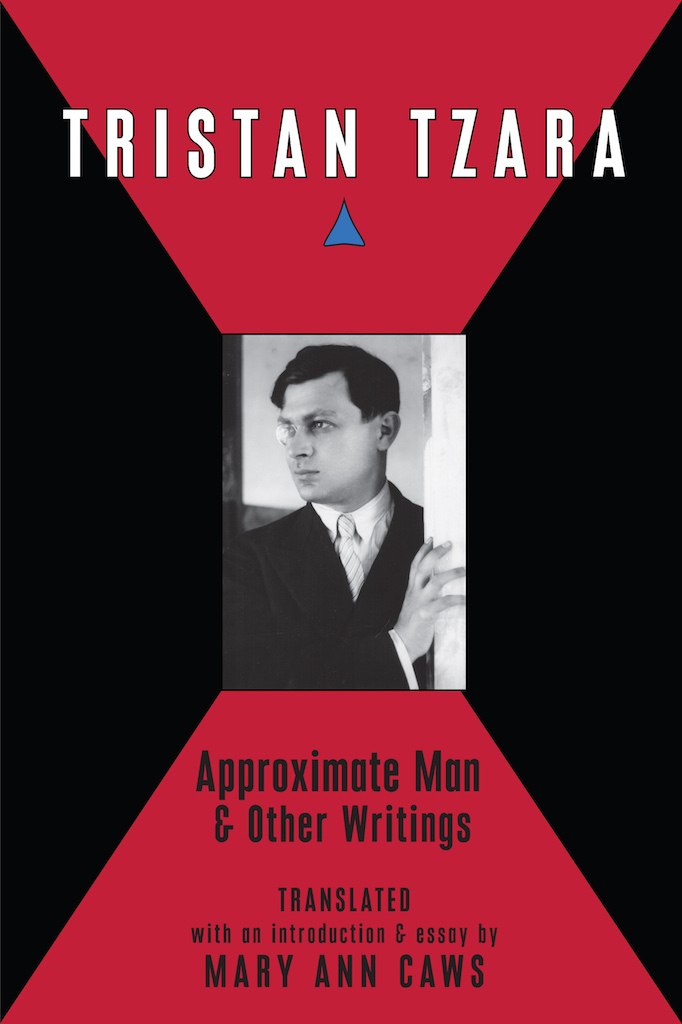Tristan Tzara is a member of my family—poetic family, chosen kin, in keeping with both poetic and queer traditions of kinship. I can’t claim that he was queer in the way we use the term now, but he certainly did not live a normative life. I was fourteen when I first got to know him, initially from Patrick Waldburg’s Thames & Hudson series volume on Surrealism, which I got at the Albright-Knox Art Museum shop in Buffalo, New York. The museum was a second home, blocks away from my actual home and across the street from the campus of the State University College at Buffalo where my mother worked as the Associate Director of Butler Library. At Butler I found the Mary Ann Caws translation of Tzara’s Approximate Man and Other Poems. Among the selected poems Caws included, “Anecdote” stood out. In fact, it settled into my body and stayed, a poetic mitochondrion.
It was the early 1980s. I was a queer teen, trans before the language of transness was available, and already disabled by chronic illness and trauma, yet unaware that these elements of my selfhood were neither flaws nor problems to be fixed. I wrote to save my life, or to give myself life, or a life. I knew that only poetry would be able to contain the life I was trying to live, and poetry was the only thing that I could fully give to the world. Already focusing on short, intense poems in my own writing, the eleven-line near-sonnet of “Anecdote” made me feel that I had a path ahead of me (“from one halt to the next”) and reassured me that I was not alone in my experiences of violent alienation and the sense of being wrong, badly-suited for what the whole world seemed to expect of me. In both form and content, “Anecdote” resonated with my own needs, perspective and experiences, both interior and as a human animal in the world.
I am thinking a lot lately around the phrase “human animal,” using it often in both private and public writing. Though it is easy to overly-interpret the animal presence in Tzara’s poems (and this one in particular), when in the last line he calls upon the horse as a personal avatar, it is not to draw easy parallels or exploit cheap symbolism: “I am a horse I am a river/I go on clumsily nevertheless I live.” He is suggesting his own absolute connection to the world and his fellow beings, even to the nonliving or formerly-alive elements of the world. “I go on leafing through landscapes to come/tearing torn faithful/made of dead wood flesh earth,” he says, making no easy distinction between human (?) narrator and the landscape. Who or what is made of dead wood, flesh or earth? Is the poet the landscape or the other way around—or some deeply disorienting combination of both? Tzara named himself after his experience of alienation and his complex relationship to land and home.1 This is about as clear a claim on one’s own troubles as one can make, and it’s one I understand and share. Even before I knew how or why, this blurring of selves (and of borders between body, self and world) was to provide one of the most formative and constant resonances in my own life and poetry. Tzara’s “I” is as fluid, elusive and plural as mine is.
Now, about that horse.
Tzara calls upon horses often and consistently in his body of work, which spanned over 50 years. They are personal avatars, yes, but against the stereotype of noble beauty or strength so often assigned them by others, his horses are lonely, awkward, hobbled, barely keeping on. Here, the horse “go[es] on clumsily” “from one halt to the next,” just as the narrator, the river and the landscape do. Who can sustain artificial demands for ease and smoothness in the face of such shifting, uneven grounds?
I too have had a decades-long poetic relationship with horses. I can’t tell if it emerged directly from Tzara’s horses or if it was some more personal response to my particular situation, involving animal resonances during the early part of hormonal transition. I have explored this question in depth over the last few years, sparked by an observation made by Avren Keating, host of the Waves Breaking podcast, during an interview. My horse, whether an offspring or adopted relation to Tzara’s, shares the rutted fields and crumbling hills with his, jumping the fences with effort, fleeing, sheltering where we can, now here, now there, going on clumsily but still—nevertheless—alive.
_________
1 “Tristan Tzara” is a punning phonetic adaptation of the Romanian phrase “triste in tara,” frequently rendered in English as “sad in the country.”




